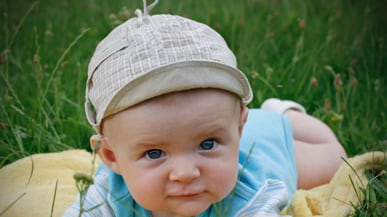When sportswriter Peter Richmond, author of Badasses, was expecting his first son 25 years ago, he didn’t want to name him Tom, after his father, or Burgess, after his grandfather, and he certainly didn’t want to name the poor kid after himself.

Instead, Richmond and his wife wanted to give their son a name that was unmistakably male yet broke rank with all the masculine names that came before it. Robert, William, and John have dominated boy-baby naming since statisticians began keeping track.
"Our nontraditional boys' names reflect our own desire to raise sons who will be as comfortable pushing dolls in strollers as pushing trucks."
Their choice: Maxfield. “We liked it that the name carried no image of masculinity, that it would free him from all preconceptions and let people see him as unique,” Richmond said.
• What Your Baby RemembersNames strike a collective unconscious, he said, and people associate names like John and Mike with “a nice house in Westchester and two cars and a dad who goes to work and a mom who doesn’t. America was built on guys with strong traditional names like George and Henry.”
The Top 10 male names of the past century conform to this image:
1. James 2. John 3. Robert 4. Michael 5. William 6. David 7. Richard 8. Joseph 9. Charles 10. Thomas
Of the Top 10 boys’ names last year, only two from the all-century list, Michael and William, still make the cut. The rest are names that would make Don (aka Dick) Draper choke on his Old-Fashioned:
1. Jacob 2. Ethan 3. Michael 4. Alexander 5. William 6. Joshua 7. Daniel 8. Jayden 9. Noah 10. Anthony
Fully half of the names on the most recent boys’ Top 100 list are choices that break with masculine naming tradition, compared with less than 20 percent of the names on the 1960 boys’ list. These include traditional names with feminine qualities such as softer sounds and/or vowel endings: Joshua, Sebastian, Elijah. Another group are names that sound assertively masculine, even tough, yet haven’t been used as first names before: Colton and Brayden, for instance. The smallest group consists of names that are shared with girls: Cameron, Dylan, and Jordan.
Of course, girls’ names have changed radically over the past generation too, but while the new girls’ names are often just a co-option of boyish names like Taylor and Peyton, the new boys’ names feel like nothing less than a reinvention of masculinity.
“With the new masculinity, wanting men to be involved fathers, to have close friendships, to really be compassionate, are all things my husband and I thought about when we gave our son his name,” said Katherine Woods-Morse, who works for a foundation in Portland, Oregon, and whose now 12-year-old son is named Paxton.
Woods-Morse chose names for her children—she also has a daughter named Torin—before she knew their genders, an effort to counteract stereotyping. “We very specifically wanted to not put a lot of gender role pressure on our children with their names, though we also didn’t want to embarrass them by going with something too feminine for a boy or too masculine for a girl.
“Pax means peace, but it’s got a strong feeling and a very masculine ending without being too butch,” said Woods-Morse. “It doesn’t leave behind the best parts of traditional masculinity—strength and taking responsibility—but it still keeps you guessing about who is this individual.”
Paxton was the 12th fastest-rising boys’ name in 2009. The other biggest risers for that year were all in the new group of boys’ names:
1. Cullen 2. Jax 3. King 4. Emmett 5. Colt 6. Braylen 7. Jett 8. Kason 9. Jasper 10. Brooks
While the softer Emmett, Jasper, and Brooks may fit Woods-Morse’s non-gendered ideal, new boys’ names like Colt and Jett (and Hunter, Ryker, and Breaker) are evidence of another brand of new boy, a rebel with tats on his neck that no suit and tie could cover—not that you could wrestle him into such a pansy get-up.
“Naming your kid Hunter or Breaker is like saying f--k you to the world that invented feminism,” said Richmond. “It’s a desperate cry to hold onto an archaic and useless form of masculinity, whereas naming your kid Robert III after your grandfather who invented the flyswatter and bought the house in Newport is a very different kind of holding onto an outmoded form of masculinity.”
For some parents, it’s not about redefining gender roles so much as redefining the next generation. “I was a child of the ’70s, my parents were children of the ’40s, and I’m trying to teach my sons you don’t have to be so traditional, to reflect more of a global culture, to open them up to different family structures and different orientations,” said Deb Levy, a New Jersey graphic designer and mother of Jacob, 10, Asher, 6, and Zane, 4.
In choosing names for her boys, Levy said, “I wanted to imbue my sons with feminist values, but you’ve also got to pack them off to school every day. You can spend all this time thinking about a name, but then they’re going to become who they’re going to be anyway.”
Is an Adrian or an Austin more likely to be sensitive; an Axel more of a renegade; an Andrew more of an old-fashioned guy?
One might argue that parents who name their sons Calum Stuart, the choice of doula and lactation consultant Virginia Wadsworth Middlemiss, also may be more likely to raise those sons in ways that are consistent with the name’s meaning of “gentle chief” (as Middlemiss says she has): attending the Unitarian Church, not playing with guns, embracing modern and open opinions and attitudes.
And yet, said Tom Recht, an engineer who lives in a Chicago suburb and is father to teenage sons Linus and Kilmer, “Around here, all the kids’ names are weird, but aside from the names, the kids themselves are very similar to the kids I went to school with. More parents than not are into the traditional male-female thing, they’re not a rebellious free-thinking crowd, except in their choice of names.”
“Among my generation of parents, our nontraditional boys’ names—vaguely androgynous, nonmacho, or just plain unique—reflect our own desire to raise sons who will be as comfortable pushing dolls in strollers as pushing trucks,” said Deborah Siegel, Ph.D., author of Sisterhood, Interrupted and founding partner of SheWrites, whose 1-year-old son is named Teo. “But what I wonder is this: Will a boy by a different name really be that much more sweet?"
Pamela Redmond Satran, a founder of nameberry.com, is the coauthor of eight books about names, including Beyond Ava & Aiden and Cool Names.






